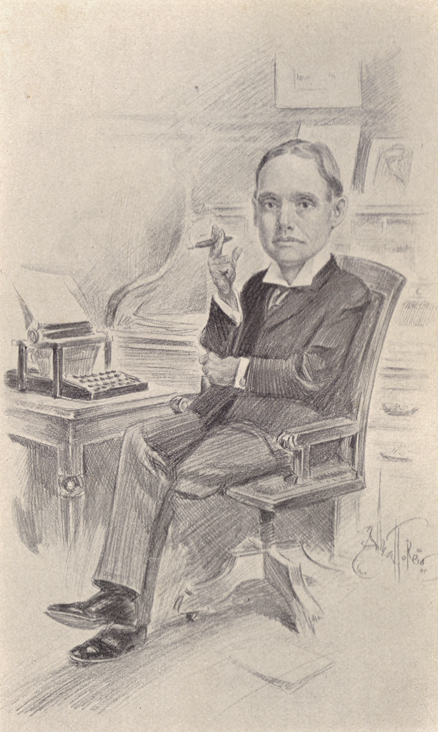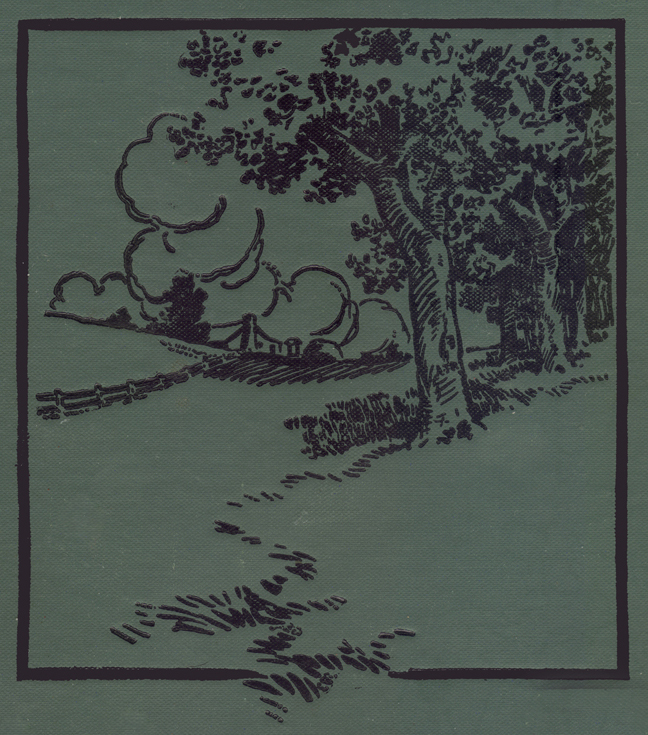
From At the Grass Roots, Comprising “The Christmas of 1883,” and Other Vagrant Sketches, by Elmer House (Dodd Gaston), with Cover Design and Frontispiece by Albert T. Reid, Topeka: Monotyped by Crane & Company, 1905; pp. 121-127.

My friend the boy, who has been away, is in love. He talks a great deal about the Girl — calls her a Queen, and wonders what she can see in him. The gang was “on,” and when he showed up in the local room they began to josh him about the Girl, but he said he couldn’t talk about her before a crowd. And the gang, appreciating his delicacy, dropped it. After dinner the boy and I drilled over to the State house grounds and lopped down under the trees. And then he told me all about it.
She’s a Baltimore girl, a junior in college, and her folks live in one of the old-fashioned houses that stand back from the street. Once, when the torrent of humanity leaped and swirled around a corner, they met face to face, and then the torrent separated and left them standing 122 alone — just he and she in all the wide, wide world alone. The boy told me this not in these words, for all this clatter is mere figure of speech, but he told me that although he felt quite unworthy of her he hoped some day to have her with him for all time.
He told me more — much more. How his love had brought soft, exquisite colors into his life, and shaped his determination and strengthened his manliness. But this is not especially interesting — the mere story, I mean. I tell it only because humanity likes to touch the hand of a man who has found his great joy. For when the torrent swirled and separated and left them standing face to face, the sweetest, finest, most comforting thing the boy will ever know came into his life.
And if it lasts — if the girl proves true, and the boy doesn’t forget — it isn’t worth while to worry about the boy any more. The game may go against him, the wheel 123 stop on the red when he plays the black, but nothing will matter much. For he has now all that is really worth striving and fretting for. And if it goes away there will come in its place a pain as bitter as his joy was keen. And he will stand alone groping for something he cannot find, crying for something that will not come, his mental faculties so numbed by the pain that everything else will seem shriveled and trivial. We may not all find and keep this treasure. There are blanks in this lottery of joy. If mine is a blank I’d like to stand close to the boy — this boy or some other boy — who has drawn a capital prize.
My friend the boy is going back to Baltimore to-day. Back to the old-fashioned house that stands away from the street and to the Girl who is watching at the window. To the boy it will be farther to Washington and Baltimore by 124 fast train than it used to be from Omaha to Sutter’s Mill by ox team. The Lake Shore Limited will crawl along like the last spring wagon in a funeral procession, and the B. & O. Royal will make a land terrapin look like a streak of chain lightning. Between Chicago and New York the hours will seem a day long; between New York and Baltimore every minute will be an eternity.
The boy hasn’t seen Her since June. All summer and fall he worked away in a stuffy little office in a Kansas tank town, where the wind blew the naked dirt in great clouds up and down the main street and the smoke of smelters clogged the atmosphere. Under the tin roof above his head it was always hot and dry or hot and sticky. Most of the people of the tank town were not his kind and their diversions did not appeal to him. But the boy didn’t mind. For he was looking forward to Her. All through the long days of the summer and early 125 fall Love sat smiling across his desk. It caressed his forehead with cooling touch as he sank to slumber, and it bade him a cheery “good-morning” from his dresser mirror when he tied his cravat next day.
This is what Bill, the police reporter, calls “using the tremolo stop.” Bill doesn’t care much for the tremolo stop, but I do. It is the sweetening of this life — the one essential flavoring of the things that are. And because I have no Great Joy of my own I am going to get up beside the boy when he goes out this winter to ride the air or bridle the clouds. For
“Of the world’s great things but four there are, —
Women and horses, love and war.”
My friend the boy is back from Baltimore, and he brings the best sort of news about the girl who lives in the old-fashioned house that stands back from the street. It seems that she has promised to marry the boy, and for him there are 126 roses blooming in the garden, the lilacs are out in the front yard and the pansies are peeping through the beds bordering the path to the gate.
Down in a little town in Kansas the boy and I slept together the other night, and he told me the Whole Story. He might have been talking yet, but the traveling gentleman in No. 5 adjoining kicked on the noise along about 4 o’clock in the morning, and we had to quit. The traveling man told the porter confidentially that he hadn’t had a wink of sleep all night and it looked as though he wasn’t going to get any.
This is the first girl the boy ever loved, and of course he made a mess of it. There was, it seems, another “lobster” hanging round, and the boy was on the anxious seat. He was so anxious that he botched his work during the day and couldn’t sleep at night. Finally, he went over, determined to settle matters. He couldn’t get his courage up, and went 127 home humiliated and dissatisfied. He tried it again, with the same result. On the third essay he blundered through it, and found that his goal line had never been in danger.
And now the boy is planning harder than ever for the future, and he thinks he can save about $500 this summer, anyway. I hope the boy’s dreams may all come true. But I am eight years older than he, and I know some things he has not learned. I know he may wake some morning to find grief sitting in a chair by his bedside and trouble peering over the footboard. Meanwhile here’s hoping — hoping that fate will step so lightly in his presence that he’ll never wake up.
